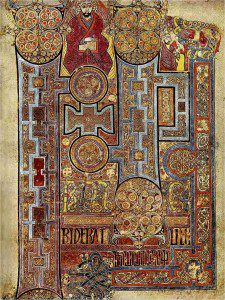The Book of Kells, c. 800 (Ireland): folio 292r: the beginning of the Gospel of John [public domain / Wikipedia]
Protestantism: Scripture is the only infallible authority (sola Scriptura).
Catholicism: “three-legged stool” comprised of Bible-Tradition-Church, with the assumption of apostolic succession, and including ecumenical councils and popes.
I’ve written two books, and lengthy parts of several others, just about that.
This is one fundamental principle of both versions of Christianity, and probably the one from which everything else might be said to be derived.
Many Protestants note that the Catholic Church claims to authoritatively interprets the Bible, which is true (though not exactly how they perceive it, in most instances, upon probing). But what they often don’t say (the hidden or unconscious premise) is that Protestants also interpret (and have to interpret) the Bible, just as we do. The Bible isn’t self-evident (as the Protestant view, in effect, would have it). And this is why Protestants notoriously disagree on many major issues. The classic one I highlight in my first book is baptism: where they have five major views.
The real choice, then, isn’t:
“Bible vs. Church”
but rather:
“Individual or denominational interpretation of the Bible vs. an interpretation of an authoritative Church based on 2,000 years of unbroken developing biblical, apostolic, and patristic tradition and theology.”
Seen that way, the Catholic approach is clearly (I think) superior, because it has historical substance and continuity, and isn’t individualistic or sectarian (which is not a biblical concept at all: nor has anyone ever remotely shown it to be).
Protestants often think Catholics are running down the Bible whenever we criticize sola Scriptura, because they are taught to think in illogical “either/or” terms, and because they equate sola Scriptura with love and reverence for the Bible (the two are not at all the same thing).
The Bible uses similar, Catholic-like “both/and” language: “What does it profit, my brethren, if a man says he has faith but has not works? Can his faith save him?” (James 2:14, RSV). The point is that faith and works inevitably must be together. By the reasoning of many Protestants, saying that faith is of no profit unless accompanied by works, is to run down faith. But of course, St. James is not doing that at all. He is simply saying that faith cannot be isolated.
Likewise, we Catholics say that the Bible is not isolated. To assert this is not to run it down at all (not in the slightest), anymore than faith is run down in Scripture. The fault lies in the erroneous interpretation of the language and the idea.
Many a Protestant simply assumes illogically that to disagree with sola Scriptura (the false notion that the Bible is the only infallible source of authority) is automatically to disrespect Scripture. This is absurd. Basically, it amounts to saying, “if you don’t take my particular position on the rule of faith, you’re a bad guy. No one could possibly disagree with sola Scriptura and also reverence the Bible. They must agree with my [doctrinaire Protestant] position in order to love the Bible.”
Needless to say, this is hogwash, and doesn’t follow. Many Protestants are so wrapped up in sola Scriptura — like a fish in a fishbowl, that doesn’t know it’s in one, or that there is a world outside of the bowl — that they can’t even comprehend or imagine any other position on the relationship of Bible, Church, and tradition, and so must run down any other view as somehow unsavory and irreverent.
I was asked: “Why would one need [in order to bolster sola Scriptura] a statement from the Bible that the Bible is the only infallible rule of faith?”
I replied:
1. because it is altogether to be expected that a source that is claimed as the only infallible one, would make the claim in the first place, and not simply assume its own status as self-evident.
2. because it is the only way that the claim can escape vicious self-contradiction:
A) there is one infallible source.
B) the claim of A is either infallible or fallible.
C) in order to be infallible, by the system’s own criteria, it must be in the Bible itself.
D) But it is not. Therefore, Protestants are relying on a fallible assertion of men (no different than any other tradition) in order to establish that a document is infallible. This makes no sense. It’s thoroughly incoherent and inconsistent. Protestants rail against tradition and then turn around and are forced to use one in order to supposedly overthrow all tradition as authoritative.
If anyone is interested in a much deeper analysis of this fundamental issue of Christian authority, I have written two entire books critiquing sola Scriptura (one / two).














